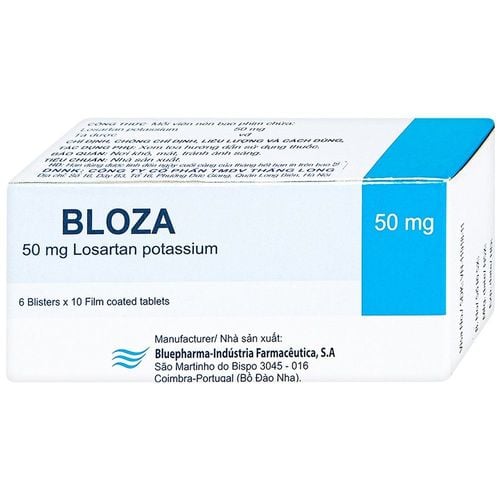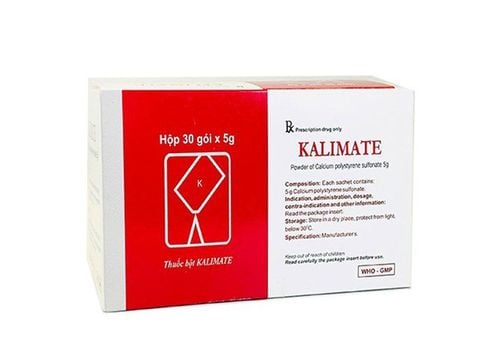This is an automatically translated article.
Betahema belongs to a group of drugs that act on the blood, with the main active ingredient being Recombinant human erythropoietin beta. So what effect does Betahema have, what precautions should be taken when using it? Let's find out information about the drug through the article below.1. What is Betahema?
Betahema belongs to a group of drugs that act on blood, indicated in the treatment of anemia in patients with chronic renal failure, cancer chemotherapy patients and anemia in premature infants. The active ingredient Betahema is Recombinant human erythropoietin beta (r-HuEPO) 2000 IU. Excipients include: sodium chloride, anhydrous disodium phosphate, anhydrous monosodium phosphate, human albumin (20% solution), sodium hydroxide/hydrochloric acid, water for injection.Betahema drug is prepared in the form of a transparent injection solution. Packaged in a box of 1 vial x 1ml.
2. What are the effects of Betahema?
The active ingredient Erythropoietin beta contained in the drug is a glycoprotein, which stimulates erythropoiesis. Erythropoietin beta also acts as a differentiation hormone and mitotic factor.Betahema is indicated for use in:
Anemia in premature babies. Anemia in patients with chronic renal failure, including patients with and without hemodialysis: Betahema is indicated to increase or maintain red blood cell count, reducing the need for blood transfusion. Anemia in Cancer Chemotherapy Patients: Betahema is indicated for the treatment of anemia caused by chemotherapy, reducing the need for blood transfusion in this patient for at least 2 months.
3. How to use Betahema
3.1. How to use Betahema For Betahema, patients use it in the following ways:
Subcutaneous injection: The maximum injection volume should not exceed 1ml each time. Inject into the abdominal wall or arm. Intravenous injection: Inject over 1 to 5 minutes depending on the dose used and the patient's condition. Do not administer intravenously or inject with other medicinal solutions. Infusion should not be used if foreign particles are detected or the drug is discolored. 3.2. Dosage of Betahema The recommended dose of Betahema for each subject is as follows:
Anemia in premature infants:
Subcutaneous injection at a dose of 250 IU/kg, 3 times per week. Treatment should be started as soon as possible and continued for 6 weeks. Anemia in patients with chronic renal failure:
Intravenous or subcutaneous injection. Initial dose: For adults, use 50 to 100 units/kg, 3 times per week. For pediatric patients, use 50 units/kg, 3 times weekly. Adjust the dose individually for each patient to achieve maintenance and hemoglobin levels between 10 and 12 g/dL. Maintenance dose: Must be calculated for each patient. Anemia in cancer chemotherapy patients:
Initial dose: Adults 150 units/kg or 40,000 units, 3 times per week. If an adequate response is not achieved after 8 weeks of treatment, the dose may be increased to 300 units/kg three times a week. Discontinue use when hemoglobin exceeds 12 g/dL. When the hemoglobin level is at a level that requires a blood transfusion, restart the drug at a 25% reduction in the previous dose. 3.3. Overdose: Manifestations of erythropoietin beta overdose usually include signs and symptoms of marked and/or rapidly increasing hemoglobin levels, including cardiovascular events. In case of overdose of Erythropoietin beta, patients should be closely monitored for cardiovascular events and hematological abnormalities.
3.4. Contraindications Betahema Drug Betahema is contraindicated in the following cases:
Cases where the patient is allergic, sensitive to Erythropoietin beta or any of its ingredients. Uncontrolled arterial hypertension. Hypersensitivity to drugs derived from mammalian cells. Hypersensitivity to albumin (human).
4. Note when using Betahema
Warnings and cautions when using Betahema
Care should be taken when using drugs of biological origin because of the possibility of allergic reactions. A transient rash has occasionally been reported with the use of A. The safety and efficacy of Erythropoietin beta have not been established in patients with a history of epilepsy or hematologic disorders (such as sickle cell anemia, syndromes, etc.) coagulopathy or myelodysplastic syndrome). In some female patients, re-menstruation may occur, therefore contraceptive measures should be considered. Elevated porphyria have been reported with rare frequency in patients with chronic renal failure while taking the drug. Erythropoietin beta should be used with caution in patients with a history of porphyria. Evaluation of Iron Store: During the use of Erythropoietin beta, total iron deficiency or functional iron deficiency may occur. Most patients require iron supplementation to enhance or maintain transferrin saturation to support erythropoiesis when stimulated by Erythropoietin beta. Children: Safety in pediatric patients under 1 month of age has not been established. For elderly patients: The dose should be selected and adjusted for each elderly patient. For patients with chronic renal failure not requiring dialysis: Close monitoring of renal function and water-electrolyte balance is required. For cancer chemotherapy patients: Hypertension due to hemoglobin concentration has been reported with rare frequency with the use of the drug. Patients with pre-existing neurological disease may have epilepsy. For pregnant women: Erythropoietin beta should be used during pregnancy only if the potential benefit outweighs the potential risk to the fetus. For nursing women: Betahema should be used with caution in this patient because it is not known whether Erythropoietin beta is secreted into breast milk. Unexpected side effects when using Betahema drug
Adverse reactions when using Betahema drug in controlled clinical trials in patients with renal failure are as follows:
Vascular disorders: Hypertension, seizures hypertension. Nervous system disorders: Headache. Blood and Lymphatic System Disorders: Thrombocytopenia, thrombocytopenia. In cancer patients:
Vascular disorders: Hypertension. Blood and Lymphatic System Disorders: Thromboembolic events. Nervous system disorders: Headache. In premature neonates:
Decrease in serum ferritin levels is very common. Interactions, drug incompatibilities Betahema
No data showing that interactions with other drugs have been detected.
Store Betahema medicine
Store medicine at 2-8°C, do not freeze or shake. Avoid direct exposure to sunlight. Keep medicine out of reach of children. Above is all the necessary information when using Betahema. Betahema must be used under the direction of the treating physician. Hopefully, the article has provided all the necessary notes for readers to be able to use Betahema drugs effectively.
Follow Vinmec International General Hospital website to get more health, nutrition and beauty information to protect the health of yourself and your loved ones in your family.













